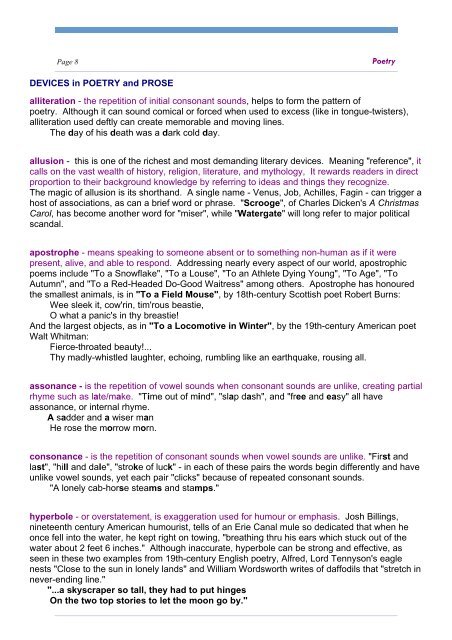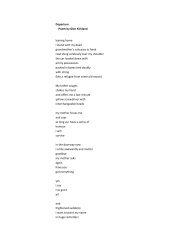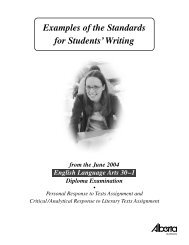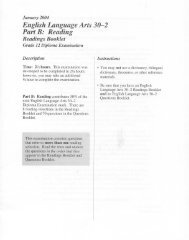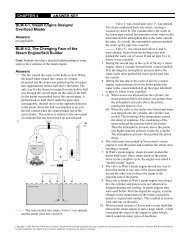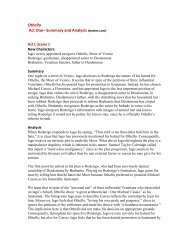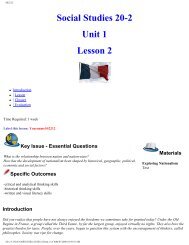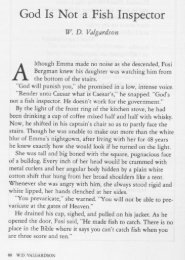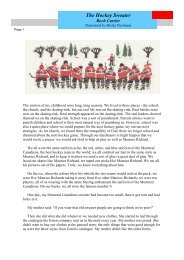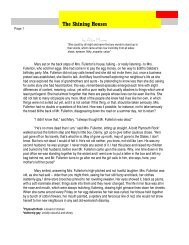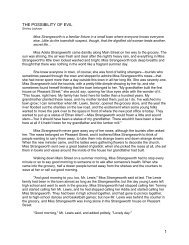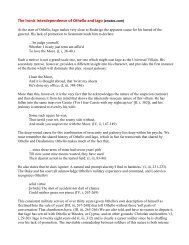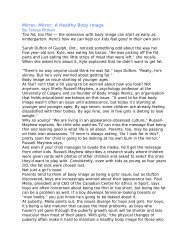poetry NOTES
poetry NOTES
poetry NOTES
You also want an ePaper? Increase the reach of your titles
YUMPU automatically turns print PDFs into web optimized ePapers that Google loves.
Page 8 Poetry<br />
DEVICES in POETRY and PROSE<br />
alliteration - the repetition of initial consonant sounds, helps to form the pattern of<br />
<strong>poetry</strong>. Although it can sound comical or forced when used to excess (like in tongue-twisters),<br />
alliteration used deftly can create memorable and moving lines.<br />
The day of his death was a dark cold day.<br />
allusion - this is one of the richest and most demanding literary devices. Meaning "reference", it<br />
calls on the vast wealth of history, religion, literature, and mythology, It rewards readers in direct<br />
proportion to their background knowledge by referring to ideas and things they recognize.<br />
The magic of allusion is its shorthand. A single name - Venus, Job, Achilles, Fagin - can trigger a<br />
host of associations, as can a brief word or phrase. "Scrooge", of Charles Dicken's A Christmas<br />
Carol, has become another word for "miser", while "Watergate" will long refer to major political<br />
scandal.<br />
apostrophe - means speaking to someone absent or to something non-human as if it were<br />
present, alive, and able to respond. Addressing nearly every aspect of our world, apostrophic<br />
poems include "To a Snowflake", "To a Louse", "To an Athlete Dying Young", "To Age", "To<br />
Autumn", and "To a Red-Headed Do-Good Waitress" among others. Apostrophe has honoured<br />
the smallest animals, is in "To a Field Mouse", by 18th-century Scottish poet Robert Burns:<br />
Wee sleek it, cow'rin, tim'rous beastie,<br />
O what a panic's in thy breastie!<br />
And the largest objects, as in "To a Locomotive in Winter", by the 19th-century American poet<br />
Walt Whitman:<br />
Fierce-throated beauty!...<br />
Thy madly-whistled laughter, echoing, rumbling like an earthquake, rousing all.<br />
assonance - is the repetition of vowel sounds when consonant sounds are unlike, creating partial<br />
rhyme such as late/make. "Time out of mind", "slap dash", and "free and easy" all have<br />
assonance, or internal rhyme.<br />
A sadder and a wiser man<br />
He rose the morrow morn.<br />
consonance - is the repetition of consonant sounds when vowel sounds are unlike. "First and<br />
last", "hill and dale", "stroke of luck" - in each of these pairs the words begin differently and have<br />
unlike vowel sounds, yet each pair "clicks" because of repeated consonant sounds.<br />
"A lonely cab-horse steams and stamps."<br />
hyperbole - or overstatement, is exaggeration used for humour or emphasis. Josh Billings,<br />
nineteenth century American humourist, tells of an Erie Canal mule so dedicated that when he<br />
once fell into the water, he kept right on towing, "breathing thru his ears which stuck out of the<br />
water about 2 feet 6 inches." Although inaccurate, hyperbole can be strong and effective, as<br />
seen in these two examples from 19th-century English <strong>poetry</strong>, Alfred, Lord Tennyson's eagle<br />
nests "Close to the sun in lonely lands" and William Wordsworth writes of daffodils that "stretch in<br />
never-ending line."<br />
"...a skyscraper so tall, they had to put hinges<br />
On the two top stories to let the moon go by."


